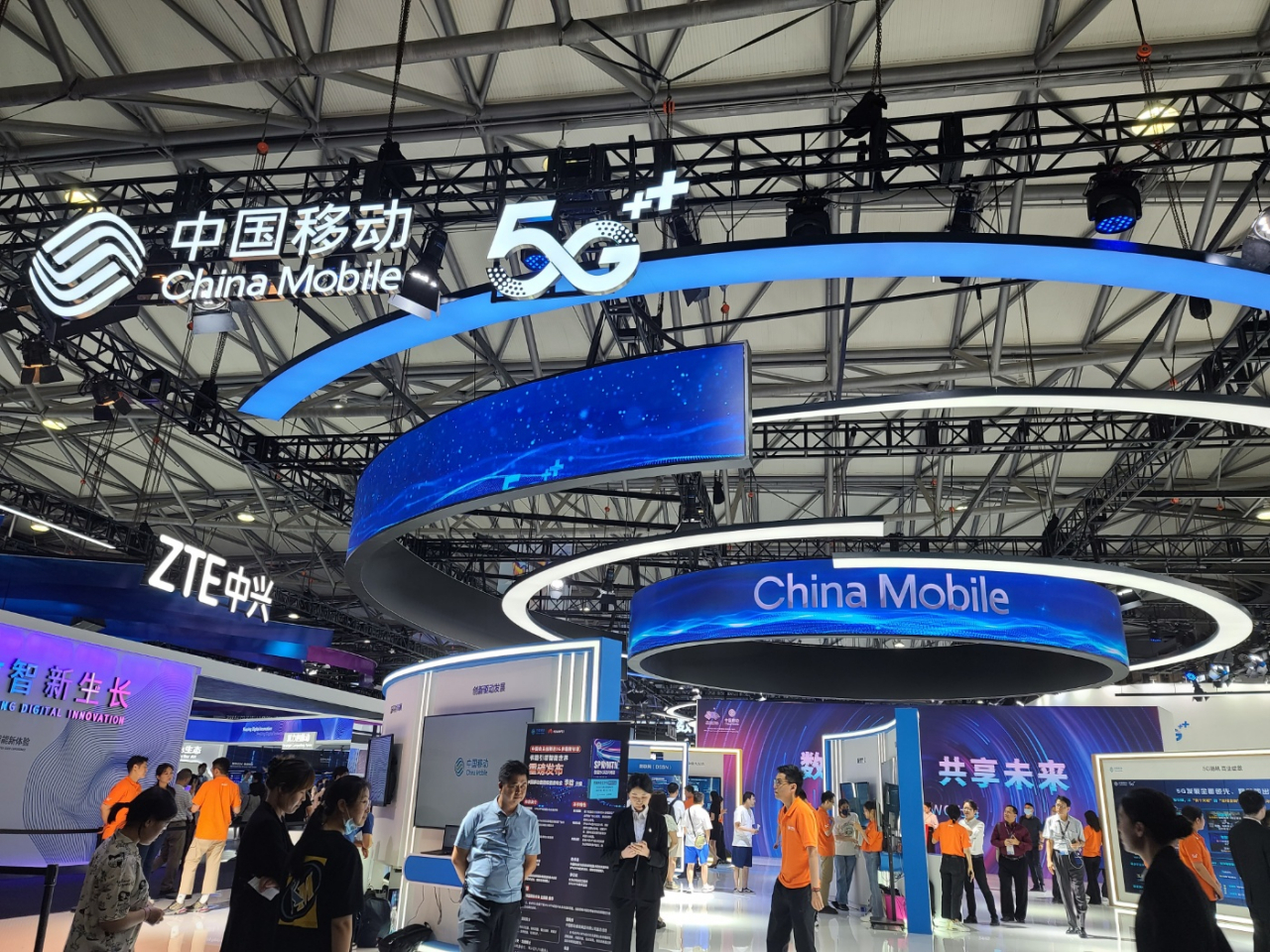 |
China Mobile's exhibition booth during the MWC Shanghai 2023 at Shanghai New International Expo Center, in Shanghai. (Jie Ye-eun/The Korea Herald) |
SHANGHAI -- The Mobile World Congress Shanghai, which returned as an in-person event after a two-year hiatus, wrapped up on Friday. Some 300 companies participated in the three-day event to boast their latest innovation practice of the fifth-generation business but mostly centered around the Chinese telecommunications industry.
The number of companies that set up exhibition booths at this year’s MWC Shanghai was nearly halved from some 550 in 2019. Around 37,000 people participated in the event this year with foreign participants taking up less than 10 percent, according to London-based GSMA, the organizer of the annual trade show.
An organizer official blamed the low attendance rate this year on the limited issuance of Chinese visas. Meanwhile, it was hard to find overseas-based companies there, except sponsors such as Qualcomm and Ericsson.
Samsung Electronics also skipped the trade show for the first time since 2017, with major South Korean mobile carriers -- SK Telecom, KT Corp. and LG Uplus -- who were key exhibitors during the MWC in Barcelona, not opting to set up booths at the Shanghai show.
“We already participated in the flagship annual trade show, MWC Barcelona, in February. Whether to attend the show in Shanghai is our China office’s decision, considering various business conditions there,” a Samsung Electronics official in Seoul told The Korea Herald.
Despite the Shanghai trade show being considered Asia’s most influential event in the telecom industry, most of the exhibition booths provided Chinese explanations only. Only a few exhibitors spoke English, and it was rare to find English-language pamphlets. Most of the keynote presentations were also conducted in Chinese, except for the speakers from the GSMA and foreign companies.
“With the COVID-19 pandemic, the MWC Shanghai has become more of a business-to-business event for Chinese firms,” an industry official in Korea said on condition of anonymity. “The intensified rivalry between the US and China has also largely affected foreign companies’ participation. Their interest in the event is waning.”
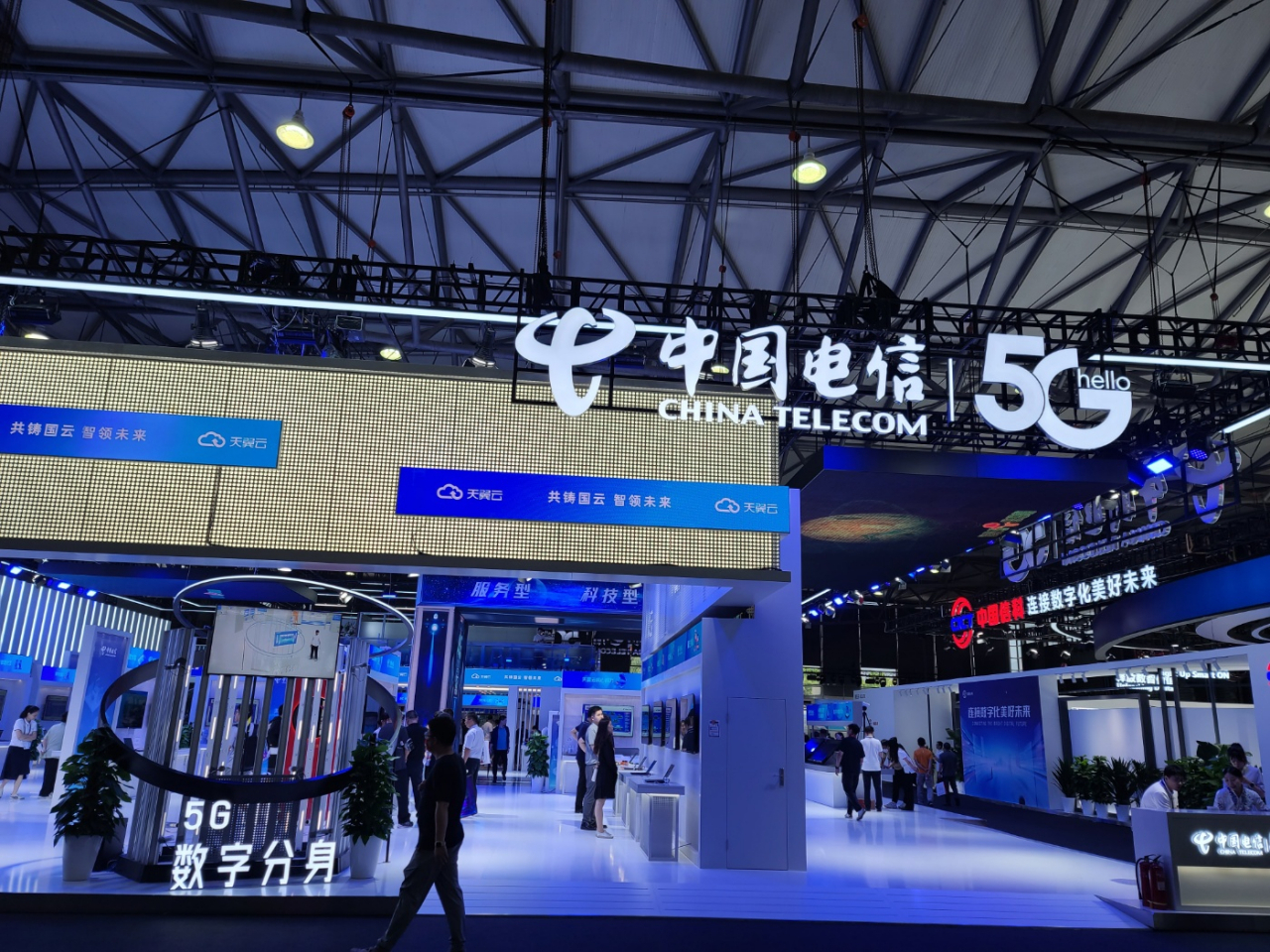 |
China Telecom's 5G-related exhibition booth during the MWC Shanghai 2023 at Shanghai New International Expo Center in Shanghai. (Jie Ye-eun/The Korea Herald) |
Major Chinese telecom firms including China Mobile, China Telecom and China Unicom touted 5G products and services as life-changing technologies. With a bigger growth opportunity in the business-to-business market, they introduced some of their 5G applied technologies for smart factories and smart mines, as well as artificial intelligence-generated content. Some firms even showcased 6G-based hyperconnected technology that could be realized in the future.
Huawei unveiled its new 5G vision, promoting ultimate network performance and energy saving with global operators. The vision adheres to the philosophy of “5GigaGreen,” which emphasizes continuous innovation in ultra-wideband, multi-antenna and maximized passive capability. It also includes a "0-bit 0-watt" equipment and network to take 5G from good to great, according to Gan Bin, vice president and chief marketing officer at Huawei Wireless Network Product Line.
Unlike previous MWCs which had been a venue to introduce the latest smartphones, smartphone makers had little presence at this year’s Shanghai trade show. Chinese smartphone makers such as Oppo, Vivo and Xiaomi were also not on the participant list. Meizu, Huawei Technologies, ZTE Corporation and Lenovo Group were some of the Chinese firms to display smartphones. Honor CEO George Zhao only teased its upcoming foldable smartphone, Magic V2, during a keynote session.
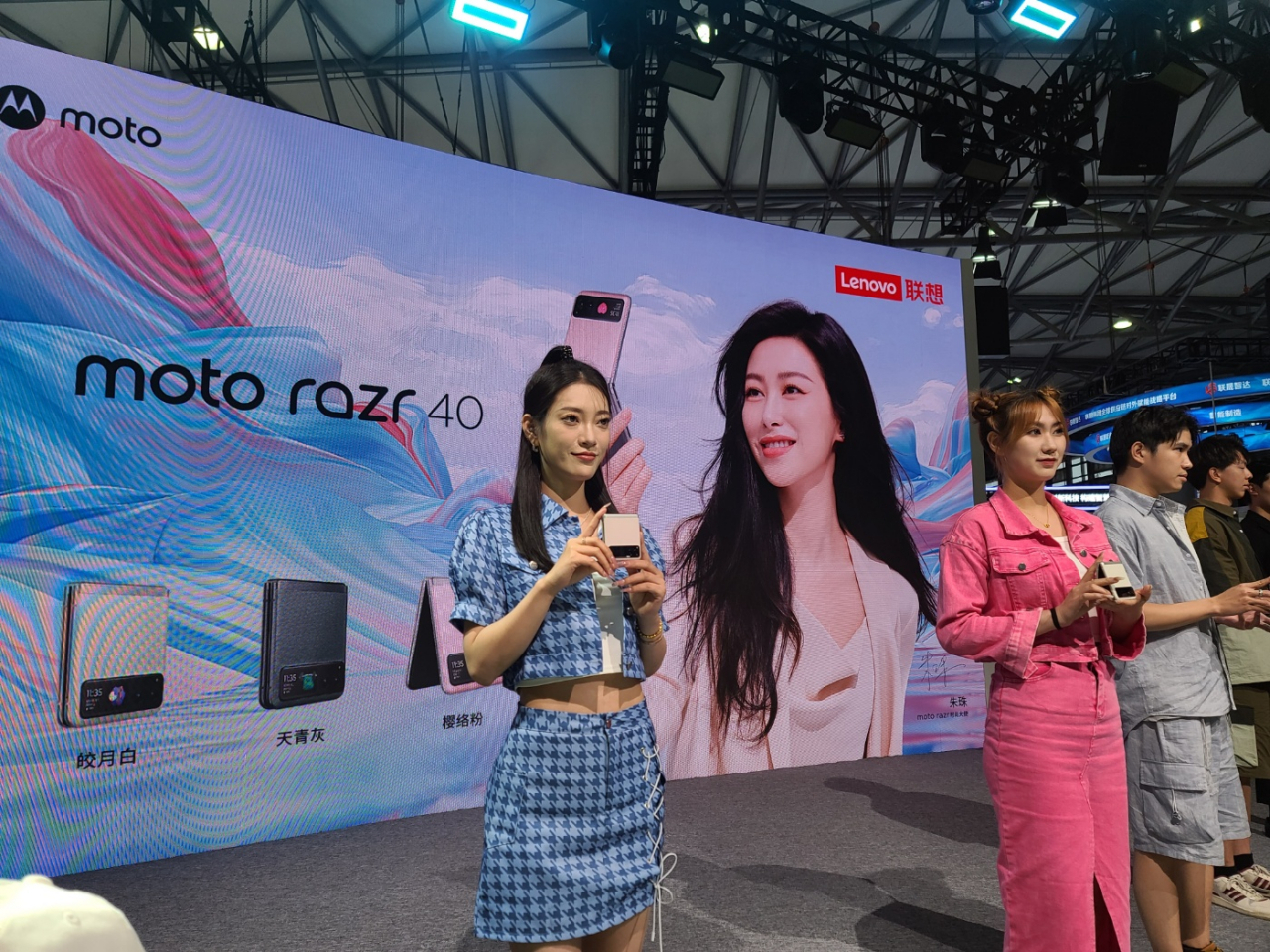 |
Models showcase Lenovo-owned Motorola's latest foldable smartphone series, Moto Razr 40 Ultra and Moto Razr 40, during the MWC Shanghai 2023 at Shanghai New International Expo Center, Shanghai, Friday. (Jie Ye-eun/The Korea Herald) |
Lenovo-owned Motorola’s latest foldable smartphone lineup -- the Moto Razr 40 Ultra and Moto Razr 40 -- were displayed at Lenovo’s booth. When the smartphone series was released last month, it was often compared with Samsung’s latest Z series, the Galaxy Z Flip4. In the meantime, Huawei offered a cloud phone solution where users can access separate or multiple virtual phones through a dedicated application.
Some of the latest digital products presented were augmented reality glasses. Beijing-based AR brand Xreal showcased its Xreal Air AR glasses in line with the booming metaverse wave and Apple's upcoming release of its own mixed reality headset, the Vision Pro. The AR glasses feature immersive digital entertainment and remote working, with a new function to connect PC and Mac laptops to "create" three screens in front of users' eyes.
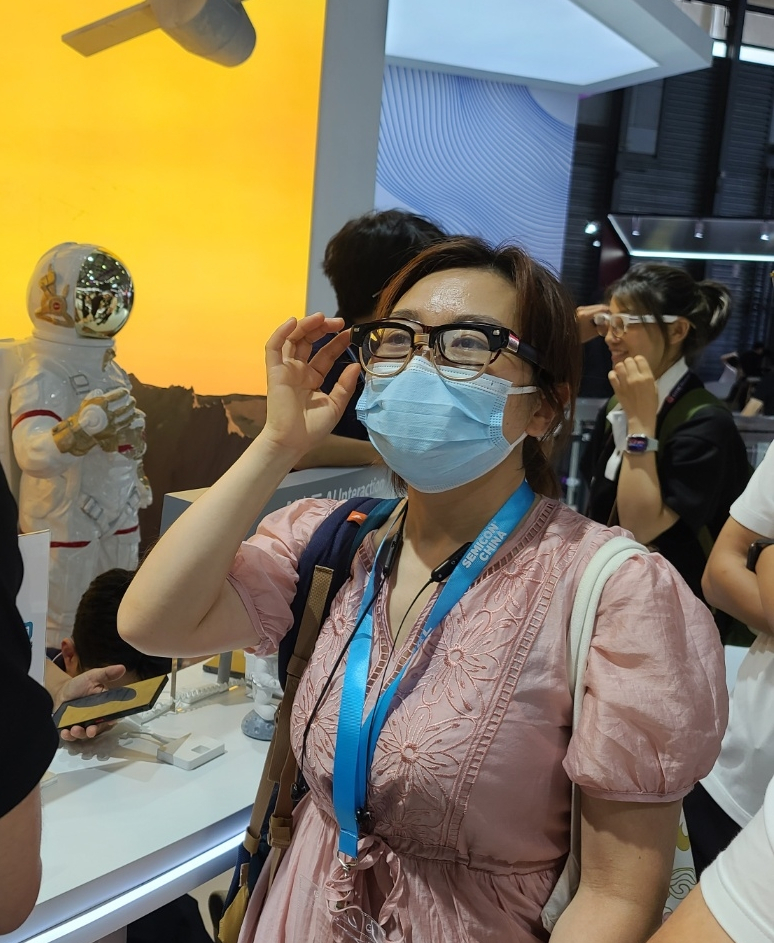 |
A visitor experiences ZTE's AR eyewear, Nubia Neo Air, during the MWC Shanghai 2023 at Shanghai New International Expo Center, in Shanghai. (Jie Ye-eun/The Korea Herald |
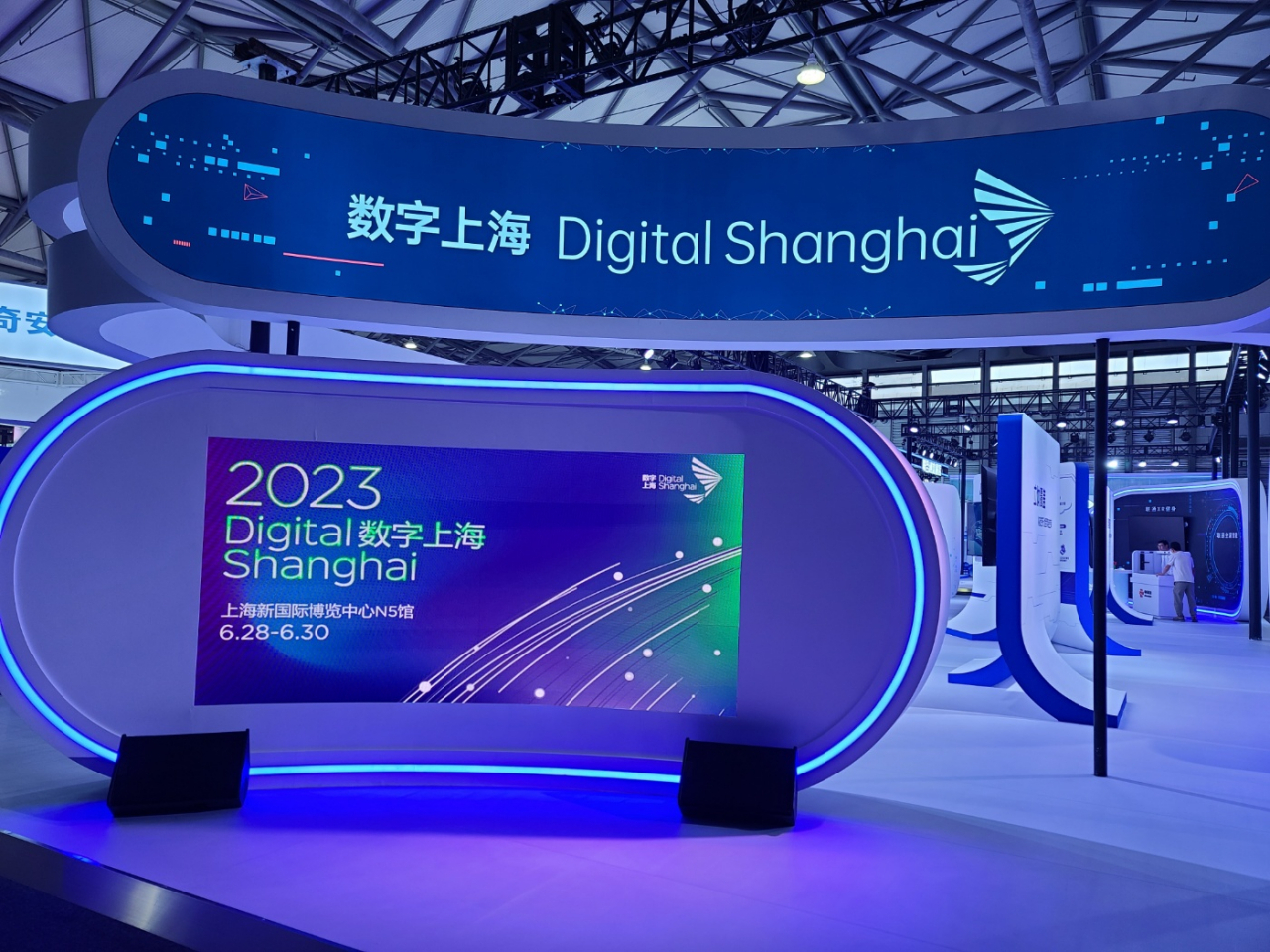 |
Marking the 10th anniversary, the MWC Shanghai sets up a separate exhibition hall, "Digital Shanghai," at Shanghai New International Expo Center, in Shanghai. (Jie Ye-eun/The Korea Herald) |
ZTE also introduced its first smart AR eyewear, Nubia Neo Air, which offers the highest possible visual and audio quality. The smart AR glasses use a generative AI model to provide real-time visual aids and immediate answers upon users' requests in English and Chinese.
Marking the 10th anniversary, the MWC Shanghai had a separate exhibition hall, "Digital Shanghai," for the first time. It highlighted the global vision and strategic position of Shanghai City.
Next year's MWC Barcelona and MWC Shanghai will be held on Feb. 26-29 and in July, respectively.
By Jie Ye-eun
Korea Herald correspondent







